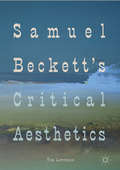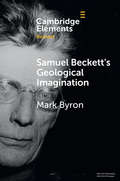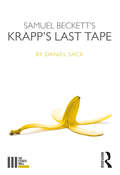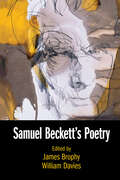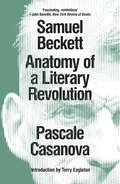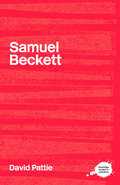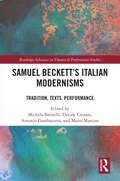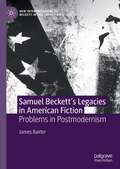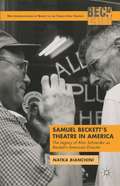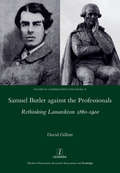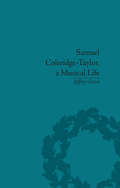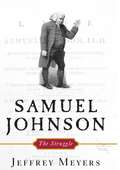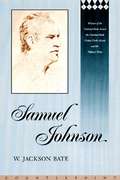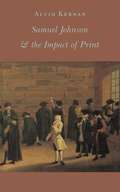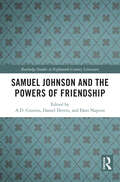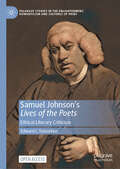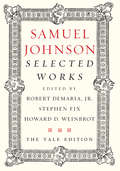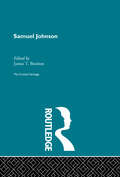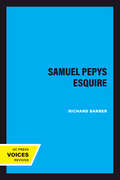- Table View
- List View
Samuel Beckett's Critical Aesthetics
by Tim LawrenceThis book considers how Samuel Beckett’s critical essays, dialogues and reflections drew together longstanding philosophical discourses about the nature of representation, and fostered crucial, yet overlooked, connections between these discourses and his fiction and poetry. It also pays attention to Beckett’s writing for little-magazines in France from the 1930s to the 1950s, before going on to consider how the style of Beckett’s late prose recalls and develops figures and themes in his critical writing. By providing a long-overdue assessment of Beckett’s work as a critic, this study shows how Beckett developed a new aesthetic in knowing dialogue with ideas including phenomenology, Kandinsky’s theories of abstraction, and avant-garde movements such as Surrealism. This book will be illuminating for students and researchers interested not just in Beckett, but in literary modernism, the avant-garde, European visual culture and philosophy.
Samuel Beckett's Geological Imagination (Elements in Beckett Studies)
by Mark ByronSamuel Beckett's Geological Imagination addresses the ubiquity of earthy objects in Beckett's prose, drama and poetry, exploring how mineral and archaeological objects bear upon the themes, narrative locus, and sensibilities of Beckett's texts in surprisingly varied ways. By deploying figures of ruination and excavation with etymological self-awareness, Beckett's late prose narratives – Company, Ill Seen Ill Said, and Worstward Ho – comprise a late-career meditation on the stratigraphic layerings of language and memory over an extended writing career. These layers comprise an embodied record of writing in their allusions to literary history and to Beckett's own oeuvre.
Samuel Beckett's Krapp's Last Tape (The Fourth Wall)
by Daniel Sack"We lay there without moving. But under us all moved, and moved us." - Krapp Samuel Beckett’s most accessible play is also one of the twentieth century’s most moving dramas about aging, memory, and disappointment. Daniel Sack offers the first comprehensive survey of Krapp’s Last Tape (1958) with a general reader in mind. Structured around a series of questions, five approachable sections contextualize the play in the larger career of its Nobel-Prize-winning writer, explore its major thematic concerns, and offer comparative analyses with Beckett’s other signal works. Sack also uses discussions of significant productions, including those directed by the playwright himself, to ground interpretation of the play in terms of its performance and provide a useful resource to directors and actors. Both a critical and personal exploration of this haunting play, this volume is a must-read for anyone with an interest in Beckett’s work.
Samuel Beckett's Poetry
by William Davies James BrophySamuel Beckett's Poetry is the first book-length study of Beckett's complete poetry, designed for students and scholars of twentieth century poetry and literature, as well as for specialists of Beckett's work. This volume explores how poetry provided Beckett a medium of expression during key moments in his life, from his earliest attempts at securing a reputation as a published writer, to the work of restoring his own speech while suffering aphasia shortly before his death. Often these were moments of desperation and discouragement, when more substantial works were not possible: moments of illness, of personal loss or of public disaster. This volume includes an introduction that contextualizes Beckett as a poet and a chronology of the composition and publication of all his known poems. Essays offer a range of critical perspectives, from translation theory, war poetics and Irish Studies to Beckett's debts to Modernism, Romanticism and the Jazz Age.
Samuel Beckett: Anatomy of a Literary Revolution
by Pascale CasanovaIn this fascinating new exploration of Samuel Beckett&’s work, Pascale Casanova argues that Beckett&’s reputation rests on a pervasive misreading of his oeuvre, which neglects entirely the literary revolution he instigated. Reintroducing the historical into the heart of this body of work, Casanova provides an arresting portrait of Beckett as radically subversive—doing for writing what Kandinsky did for art—and in the process presents the key to some of the most profound enigmas of Beckett&’s writing.
Samuel Beckett: Intersections With Popular Culture (Routledge Guides to Literature #6)
by David PattieSamuel Beckett's work forever changed the concepts of literature and theatre. His work remains a core part of introductory courses on literary history, drama, theatre or performance and also features in more specialist modules such as Modernism or The Absurd. Samuel Beckett is a comprehensive introduction to his life and work as well as an outline of the critical issues surrounding his work. This guidebook leaves judgements up to the student by explaining the full range of often very different critical views and interpretations and offers guides to further reading in each area discussed.
Samuel Beckett’s Italian Modernisms: Tradition, Texts, Performance (Routledge Advances in Theatre & Performance Studies)
by Michela Bariselli Davide Crosara Antonio Gambacorta Mario MartinoIn the wake of both Joycean and Dantean celebrations, this volume aims to investigate the fecund influence of Italian culture on Samuel Beckett’s work, with a specific focus on the twentieth century.Located at the intersection of historical avant-garde movements and a renewed interest in tradition, Italian modernism reimagined Italy and its culture, projecting it beyond the shadow of fascism. Following in Joyce’s footsteps, Samuel Beckett soon became an attentive reader of Italian modernist authors. These had a profound effect on his early work, shaping his artistic identity. The influence of his early readings found its way also into Beckett’s postwar writing and, most poignantly, in his theatre. The contributions in this collection rekindle the debate around Beckett as modernist author through the lenses of Italian culture.This study will be of particular interest to students and scholars in theatre and performance studies, Italian studies, English studies, and comparative literature.
Samuel Beckett’s Legacies in American Fiction: Problems in Postmodernism (New Interpretations of Beckett in the Twenty-First Century)
by James BaxterSamuel Beckett’s Legacies in American Fiction provides an overdue investigation into Beckett’s rich influences over American writing. Through in-depth readings of postmodern authors such as Robert Coover, Donald Barthelme, Thomas Pynchon, Don DeLillo, Paul Auster and Lydia Davis, this book situates Beckett’s post-war writing of exhaustion and generation in relation to the emergence of an explosive American avant-garde. In turn, this study provides a valuable insight into the practical realities of Beckett’s dissemination in America, following the author’s long-standing relationship with the countercultural magazine Evergreen Review and its dramatic role in redrawing the possibilities of American culture in the 1960s. While Beckett would be largely removed from his American context, this book follows his vigorous, albeit sometimes awkward, reception alongside the authors and institutions central to shaping his legacies in 20th and 21st century America.
Samuel Beckett’s Theatre in America
by Natka BianchiniA study of the 30-year collaboration between playwright Samuel Beckett and director Alan Schneider, Bianchini reconstructs their shared American productions between 1956 and 1984. By examining how Beckett was introduced to American audiences, this book leads into a wider historical discussion of American theatre in the mid-to-late 20th century.
Samuel Butler against the Professionals: Rethinking Lamarckism 1860-1900
by David GillottIn the wake of the 2009 Darwin bicentenary, Samuel Butler (1835-1902) is becoming as well known for his public attack on Darwin's character and the basis of his scientific authority as for his novels Erewhon and The Way of All Flesh. In the first monograph devoted to Butler's ideas for over twenty years, David Gillott offers a much-needed reappraisal of Butler's work and shows how Lamarckian ideas pervaded the whole of Butler's wide-ranging ouevre, and not merely his evolutionary theory. In particular, he argues that Lamarckism was the foundation on which Butler's attempt to undermine professional authority in a variety of disciplines was based. Samuel Butler against the Professionals provides new insight into a fascinating but often misunderstood writer, and on the surprisingly broad application of Lamarckian ideas in the decades following publication of the Origin of Species.
Samuel Butler, Victorian Against the Grain
by James G. ParadisSamuel Butler (1835-1902), Victorian satirist, critic, and visual artist, possessed one of the most original and inquiring imaginations of his age. The author of two satires, Erewhon (1872) and The Way of All Flesh (1903), Butler's intellectually adventurous explorations along the cultural frontiers of his time appeared in volume after eccentric volume. Author of four works on evolution, he was one of the most prolific evolutionary speculators of his time. He was an innovative travel writer and art historian who used the creative insights of his own painting, photography, and local knowledge to invent, in works like Alps and Sanctuaries (1881), a vibrant Italian culture that contrasted with the spiritually frigid experience of his High Church upbringing.Despite his range and achievement, there remains surprisingly little contemporary analytical commentary on Butler's work. Samuel Butler, Victorian against the Grain is an interdisciplinary collection of essays that provides a critical overview of Butler's career, one which places his multifaceted body of work within the cultural framework of the Victorian age. The essays, taken together, discuss the formation of Victorian England's ultimate polymath, an artistic and intellectual ventriloquist who assumed an extraordinary range of roles - as satirist, novelist, evolutionist, natural theologian, travel writer, art historian, biographer, classicist, painter, and photographer.
Samuel Coleridge-Taylor, a Musical Life
by Jeffrey GreenGreen’s study is more than a biography of an Anglo-African composer.The first comprehensive study of Coleridge-Taylor’s life for almost a century, it reveals how class-ridden Britain could embrace even the most unlikely of cultural icons.
Samuel Johnson
by MeyersFord Madox Ford declared Samuel Johnson "the most tragic of all our major literary figures. ” Blessed with a formidable intellect and a burning passion for ideas, Johnson also struggled throughout his life with mental instability and numerous physical defects. One of the most illustrious figures of the English literary tradition, Johnson made his fame as poet, essayist, critic, dictionary-maker, conversationalist, and all-around larger-than-life personality. His success was all the greater for the adversity he had to overcome in achieving it. Drawing on a lifetime of study of Johnson and his era, as well as a wide array of new archival materials, noted biographer Jeffrey Meyers tells the extraordinary story of one of the great geniuses of English letters. Johnson emerges in his portrait as a mass of contradictions: lazy and energetic, aggressive and tender, melancholy and witty, comforted yet tormented by religion. He was physically repulsive and slovenly in dress and habits, but his social ideas were progressive and humane--he strongly opposed slavery and the imperial exploitation of indigenous peoples. He gave generously to the poor and homeless, rescued prostitutes, and defended criminals who’d been condemned to hang. But these charitable acts could not dispel the darkness that clouded his world: overwhelming guilt and fear of eternal damnation. A masterful portrait of a brilliant and tormented figure, this book reintroduces a new generation of readers to the heroic Dr. Johnson.
Samuel Johnson
by Walter Jackson BateW. Jackson Bate's Samuel Johnson has been hailed as a supreme example of the biographer's art and the first great modern life of Johnson. Bate's work is literary biography at its finest, delving into the character that formed Johnson's awesome intellect and fueled his prodigious output.<P><P> Winner of the Pulitzer Prize<P> Winner of the National Book Award
Samuel Johnson After 300 Years
by Greg ClinghamTo mark the tercentenary of Samuel Johnson's birth in 2009, the specially-commissioned essays contained here review his scholarly reputation. An international team of experts reflects authoritatively on the various dimensions of literary, historical, critical and ethical life touched by Johnson's extraordinary achievement. The volume distinctively casts its net widely and combines consistently innovative thinking on Johnson's historical role with a fresh sense of present criticism. Chapters cover subjects as diverse as Johnson's moral philosophy, his legal thought, his influence on Jane Austen, and the question of the Johnson canon. The contributors examine the larger theoretical and scholarly contexts in which it is now possible to situate his work, and from which it may often be necessary to differentiate it. All the contributors have a distinguished record of scholarship in eighteenth-century studies, Johnson scholarship, and cultural history and theory.
Samuel Johnson and the Impact of Print: (Originally published as Printing Technology, Letters, and Samuel Johnson)
by Alvin B. KernanThe description for this book, Samuel Johnson and the Impact of Print: (Originally published as Printing Technology, Letters, and Samuel Johnson), will be forthcoming.
Samuel Johnson and the Powers of Friendship (Routledge Studies in Eighteenth-Century Literature)
by A.D. Cousins, Daniel Derrin, and Dani NaptonThis book is the first to assess Johnson’s diverse insights into friendship—that is to say, his profound as well as widely ranging appreciation of it—over the course of his long literary career. It examines his engagements with ancient philosophies of friendship and with subsequent reformulations of or departures from that diverse inheritance. The volume explores and illuminates Johnson’s understanding of friendship in the private and public spheres—in particular, friendship’s therapeutic amelioration of personal experience and transformative impact upon civil life. Doing so, it considers both his portrayals of interaction with his friends and his more overtly fictional representations of friendship across the many genres in which he wrote. It presents at once an original re-assessment of Johnson’s writings and new interpretations of friendship as an element of civility in mid-eighteenth-century British culture.
Samuel Johnson in Context
by Jack LynchFew authors benefit from being set in their contemporary context more than Samuel Johnson. Samuel Johnson in Context is a guide to his world, offering readers a comprehensive account of eighteenth-century life and culture as it relates to his work. Short, lively and eminently readable chapters illuminate not only Johnson's own life, writings and career, but the literary, critical, journalistic, social, political, scientific, artistic, medical and financial contexts in which his works came into being. Written by leading experts in Johnson and in eighteenth-century studies, these chapters offer both depth and range of information and suggestions for further study and research. Richly illustrated, with a chronology of Johnson's life and works and an extensive bibliography, this book is a major new work of reference on eighteenth-century culture and the age of Johnson.
Samuel Johnson's Lives of the Poets: Ethical Literary Criticism (Palgrave Studies in the Enlightenment, Romanticism and Cultures of Print)
by Edward L. TomarkenThis open access book seeks to explain how the literary commentary of the Lives of the Poets speaks to us today because of its ethical goals. Edward Tomarken elucidates this element of Johnson’s literary criticism by using Ralph Cohen’s genre method, the topic of Chapter One, “Why Genre”. Chapters two to five address the most prevalent genres of the Lives: tragedy, metaphysical poetry, the epic, the pastoral elegy, and the mock epic. Chapter six considers the rise of literary criticism as a genre. Chapter Seven demonstrates how ethical genre criticism relates literature to life. And the final chapter explains why, although Johnson considers ‘moral’ and ‘ethical’ as nearly interchangeable terms, Tomarken prefers ‘ethical’ because it relates genre criticism to present problems in literary and non-literary worlds.
Samuel Johnson: Selected Works
by Samuel JohnsonA one‑volume collection of the prose and poetry of eighteenth‑century Britain's pre‑eminent lexicographer, critic, biographer, and poet Samuel Johnson Samuel Johnson was eighteenth‑century Britain&’s preeminent man of letters, and his influence endures to this day. He excelled as a moral and literary critic, biographer, lexicographer, and poet. This anthology, designed to make Johnson&’s essential works accessible to students and general readers, draws its texts from the definitive Yale Edition of the Works of Samuel Johnson. In most cases, texts are included in full rather than excerpted. The anthology includes many essays from The Rambler and other periodicals; Rasselas; the prefaces to Johnson&’s Dictionary and his edition of Shakespeare; the complete Lives of Cowley, Milton, Pope, Savage, and Gray, as well as generous selections from A Journey to the Western Islands of Scotland. Some parts are arranged thematically, allowing readers to focus on such topics as religion, marriage, war, and literature. The anthology includes a biographical introduction, and its ample annotation updates and enlarges the commentary in the YaleEdition.
Samuel Johnson: Selected Writings: A Tercentenary Celebration
by Samuel JohnsonThanks to Boswell’s monumental biography of Samuel Johnson, we remember Dr. Johnson today as a great wit and conversationalist, the rationalist epitome and the sage of the Enlightenment. He is more often quoted than read, his name invoked in party conversation on such diverse topics as marriage, sleep, deceit, mental concentration, and patriotism, to generally humorous effect. But in Johnson’s own day, he was best known as an essayist, critic, and lexicographer: a gifted writer possessed of great force of mind and wisdom. Writing a century after Johnson, Ruskin wrote of Johnson’s essays: He “taught me to measure life, and distrust fortune…he saved me forever from false thoughts and futile speculations.” Peter Martin here presents “the heart of Johnson,” a selection of some of Johnson’s best moral and critical essays. At the center of this collection are the periodical essays from the Rambler, Adventurer, and Idler. Also included are Johnson’s great moral fable, Rasselas; the Prefaces to the Dictionary and his edition of Shakespeare; and selections from Lives of the Poets. Together, these works—allied in their literary, social, and moral concerns—are the ones that continue to speak urgently to readers today.
Samuel Johnson: The Critical Heritage
by James T. BoultonFirst published in 1995. Routledge is an imprint of Taylor & Francis, an informa company.
Samuel Pepys Esquire
by Richard BarberThis title is part of UC Press's Voices Revived program, which commemorates University of California Press’s mission to seek out and cultivate the brightest minds and give them voice, reach, and impact. Drawing on a backlist dating to 1893, Voices Revived makes high-quality, peer-reviewed scholarship accessible once again using print-on-demand technology. This title was originally published in 1970.This title is part of UC Press's Voices Revived program, which commemorates University of California Press’s mission to seek out and cultivate the brightest minds and give them voice, reach, and impact. Drawing on a backlist dating to 1893, Voices Revived</DIV
Samuel Richardson
by Betty A. SchellenbergSamuel Richardson (1689-1761) was a highly regarded printer and influential novelist when he produced his final work of fiction, The History of Sir Charles Grandison (1753). Like his other novels, it was written in epistolary form, reflecting his lifelong interest in letter writing and the letter as a genre. Covering the period 1750-1754, many of these fully annotated letters are published from manuscript for the first time, or have been restored to their complete original form. Recording Richardson's relationships with leading cultural figures including Samuel Johnson, Colley Cibber and Elizabeth Carter, the volume reveals his support for other authors while struggling to complete his own 'story of a Good Man'. This publishing saga also incorporates Richardson's responses to the Irish piracy of his novel, and his exchanges with anonymous fans, including those who attacked the novel's tolerance for Catholicism and those who pleaded for a sequel.
